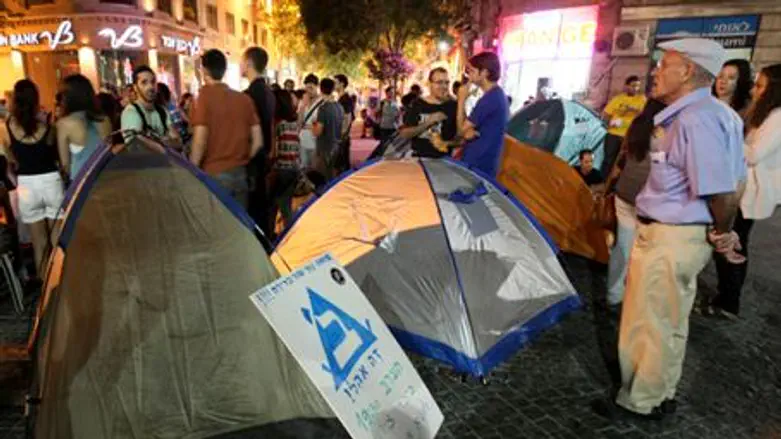
The groups purporting to represent protesters demanding affordable housing and lower costs of living on Tuesday drafted a document, in which they laid out specific demands for the changes they expected the government to undertake in order to keep the cost of living down. The demands will be passed around residents of the tent city on Rothschild Boulevard in Tel Aviv.
Among the demands in the letter are a reduction of indirect taxes, especially VAT (value added tax), currently 16%; a law requiring that money collected by tax authorities be used for current needs, and not held until the next fiscal year; the withdrawal by the government of the Housing Committees law, which the Knesset is set to vote on for its second and third reading Wednesday; more assistance for homebuyers from the Housing Ministry; free education and day care for children three months old and beyond; adding positions to hospitals and raising doctors' salaries, in line with demands by striking doctors; and a halt in the government's selloff of health and welfare institutions to private hands, along with a promise to stop using workers from “manpower” agencies who are not eligible for benefits given to regular government workers.
The groups drew up the document at a day-long meeting in Tel Aviv, and agreed that they would not adopt it as an official position paper until “the public” had a chance to review and comment on it, a process organizers said they hoped would be completed within days. Organizers on Tuesday night led a march from Rothschild Boulevard to the Hatikvah neighborhood, where they called on residents to come out of their homes and discuss the document. Organizers said they would hold other such “public meetings” in the coming days.
A major rally is planned for Wednesday outside the Knesset, where MKs will be discussing the Housing Committee law. The law is opposed by protest groups for a number of reasons, among them that the committees, which the government says will remove bureaucratic roadblocks and allow faster authorization of land for housing construction, will actually damage the environment, as it will allow the rezoning of public and agricultural land for housing construction without input from the Committee for the Preservation of Open and Agricultural Lands, as is currently the law. Other groups said that the law was too general, and that they feared that it was being passed in order to mollify the public, but would not bring about any substantial change.
Protesters said they would demand that the Knesset halt proceedings on the law as a “sign of good will” that MKs were interested in satisfying the demands of protesters.